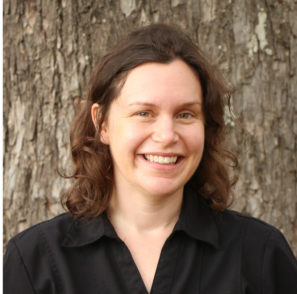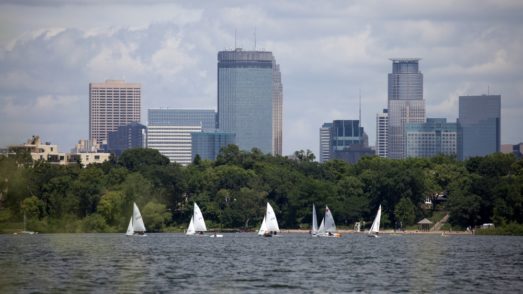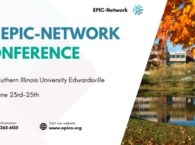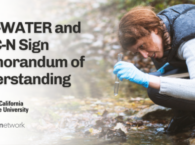Maria Dahmus develops novel ways to engage the public with community-university partnership projects

Maria Dahmus
Director
Sustainable Communities Partnership
University of St. Thomas
medahmus@stthomas.edu
+1 651-962-6391

Favorite Place
Places to be outside throughout the year, even in the very cold winters. For example, we can swim in the lakes in the summer and walk across them in the winter!
Also, in Texas, where I’m from, my favorite place is Barton Springs, a natural springs pool in Austin. And I love being underneath the water, scuba diving.
What was your first interaction with a school-community partnership project?
In 5th grade, our class participated in the start-up of our town’s first recycling program, Nacogdoches Recycles. As an introduction, we visited our local landfill. To this day, the image of all the trash in an enormous hole in the ground is strongly imprinted in my mind. It boggled my mind then, and still does now, that we literally bury our trash in the ground. Next, we had the chance to participate in the beginning of Nacogdoches Recycles. People dropped off their recyclables at the park, and we helped unload the cars. Every Saturday morning, my parents dropped me off, and I unloaded recyclables from residents’ cars with great joy! Learning about waste disposal and being able to participate in the start of a city’s recycling program had a long lasting impact on me – to imagine and experience how communities can come together to change systems. We also learned about ways people reduce waste and reuse stuff – and got to create our own ideas in class!
How did you first learn about EPIC-N?
From the instructor’s perspective – my Environmental Studies capstone course partnered with the City of St. Paul on a water resources project through CityLabs.
What are some of the top priorities you are working on this year?
Continuing to cultivate current partnerships and create new partnerships – including the most recent partnership with an art park in the area!
Continuing to develop novel ways to engage the public with project findings through SCP Arts and other endeavors to enrich community sustainability goals.
In what ways are you looking to engage, or work with others, either from within the EPIC-Network, or in general?
Learning from each other – especially strategies to increase public engagement with projects;
Learning more about why people do what they do and sharing motivation and energy.
What led you to participate within the EPIC-Network in your current capacity?
I love interdisciplinary, experiential learning in partnership with the community. I initially participated in an EPIC-N program as a course instructor. I loved the opportunity to collaborate with a city partner on questions of importance to the City, within the context of a broader partnership across disciplines. My students greatly benefited from the experience. It challenged students to apply what they were learning to real questions in their community and to navigate complexity and ambiguity in problem-solving. It also enabled them to develop relationships in the community.
When offered the opportunity to co-launch a program at St. Thomas, I was ecstatic! I am so thankful to be able to connect my love for interdisciplinary, environmental education, curriculum development, and collaborative, community-engaged sustainability efforts in my work every day!
What are you hoping attendees will take with them after attending your presentation?
For my “Adapting the EPIC Model to Institutional Context” presentation, I hope attendees learn about our experience as an example process of adapting the EPIC-N model to a mission-driven, liberal arts institution.
Transferable questions and strategies for adapting the EPIC-N model to different institutional contexts, while still achieving the overarching goals of an EPIC-N partnership.
Bio
Maria Dahmus, Ph.D. is the co-founder and director of the Sustainable Communities Partnership (SCP) in the Office of Sustainability Initiatives at the University of St. Thomas in St. Paul, Minnesota. Maria develops and implements the strategic vision for SCP, from multi-year partnerships and project development to daily operations. In 2017, Maria created SCP Arts. Through SCP Arts, students collaborate with local artists to translate SCP project findings into artwork, bringing to life partners’ sustainability goals for people of all ages. Maria received her Ph.D. in Environment and Resources at the University of Wisconsin. She studies social dimensions of sustainability, including the development of common ground and coalitions for natural resource policy among ‘unlikely partners’ and social dimensions of nutrient fluxes in the urban ecosystem. She has also worked as an experiential educator and has taught a variety of environmental studies courses, partnering on applied projects with cities and other partners, including visual and performing artists.


